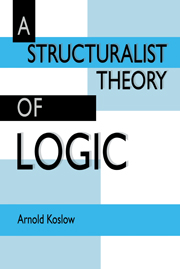Book contents
- Frontmatter
- Contents
- Preface
- Part I Background
- Part II Implication relations
- Part III The logical operators
- 11 Hypotheticals
- 12 Negations
- 13 Conjunctions
- 14 The disjunction operator
- 15 The logical operators parameterized
- 16 Further features of the operators
- 17 The dual of negation: Classical and nonclassical implication structures
- 18 The distinctness and relative power of the logical operators
- 19 Extensionality
- 20 Quantification
- 21 Identity
- 22 Special structures I: Logical operators on individuals: Mereology reconstituted
- 23 Special structures II: Interrogatives and implication relations
- 24 Completeness
- Part IV The modal operators
- Appendix A An implication relation for the integers in the programming language BASIC
- Appendix B Symmetric sequents as products of implication relations and their duals
- Appendix C Component-style logical operators and relevance
- Notes
- Bibliography
- Index
23 - Special structures II: Interrogatives and implication relations
Published online by Cambridge University Press: 05 May 2010
- Frontmatter
- Contents
- Preface
- Part I Background
- Part II Implication relations
- Part III The logical operators
- 11 Hypotheticals
- 12 Negations
- 13 Conjunctions
- 14 The disjunction operator
- 15 The logical operators parameterized
- 16 Further features of the operators
- 17 The dual of negation: Classical and nonclassical implication structures
- 18 The distinctness and relative power of the logical operators
- 19 Extensionality
- 20 Quantification
- 21 Identity
- 22 Special structures I: Logical operators on individuals: Mereology reconstituted
- 23 Special structures II: Interrogatives and implication relations
- 24 Completeness
- Part IV The modal operators
- Appendix A An implication relation for the integers in the programming language BASIC
- Appendix B Symmetric sequents as products of implication relations and their duals
- Appendix C Component-style logical operators and relevance
- Notes
- Bibliography
- Index
Summary
Elementary questions about interrogatives
There has been some penetrating work on the logic of interrogatives, but it is not the aim of this study to review those findings. It is well known that there are interestingly different kinds of questions that count as interrogatives, and it has also been suggested that an account of questions can profitably be seen as part of the study of a more general notion. That is, if, roughly speaking, the logic of questions (erotetic logic) is seen as the study of wanted answers, then the somewhat more general setting would consider the notion of a relevant answer. And still other, more general settings for the logic of questions have been suggested. Perhaps the most complex issue that has to be faced is the typology of questions, since each study seems to use a different classification. No doubt this reflects, in part, the variety of theoretical devices that are brought to bear on the subject.
In this chapter we want to show how the use of a special implication relation among certain kinds of questions can be used to answer some elementary problems about questions. We shall not introduce a special typology to sort out different kinds of questions from each other. The problems that we shall consider lie at a rather elementary level and do not seem to need a more subtle classification for their discussion. A more detailed classification will eventually be necessary, because it is only with the aid of more refined structures that anything interesting can be proved and that anything accurate can be said about whether specific sentences in English are examples of one type of interrogative rather than another.
- Type
- Chapter
- Information
- A Structuralist Theory of Logic , pp. 218 - 228Publisher: Cambridge University PressPrint publication year: 1992



